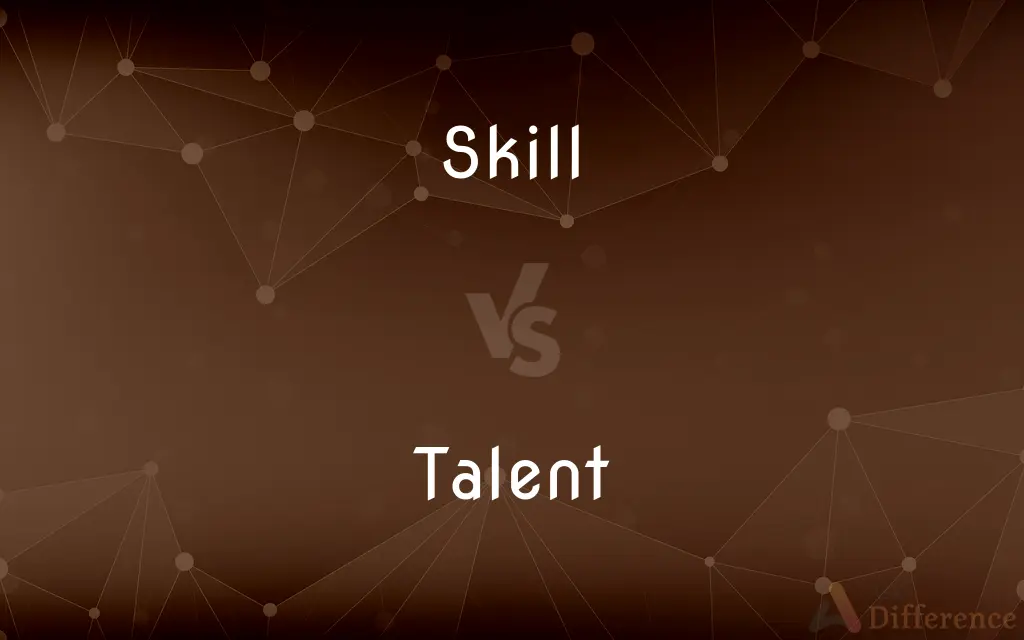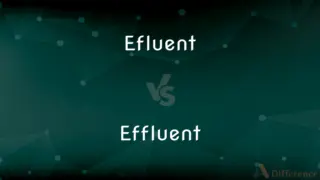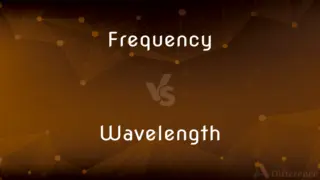Skill vs. Talent — What's the Difference?
By Tayyaba Rehman — Published on September 6, 2023
Skill is acquired through learning and practice, while talent is a natural aptitude or ability.

Difference Between Skill and Talent
Table of Contents
ADVERTISEMENT
Key Differences
Skill is a capability acquired through consistent practice, training, or experience. Talent, on the other hand, refers to a natural aptitude or ability that an individual possesses without formal training.
While skills are developed over time and can be honed with dedication and effort, talents are innate and can give an individual an edge in certain activities or areas from a young age.
Both skill and talent play essential roles in determining proficiency. For example, a musician might have a natural talent for understanding rhythm and melody but requires skills in reading music and practicing an instrument to achieve excellence.
It is possible for someone to have a talent in a specific domain but lack the skills necessary to fully exploit it. Conversely, someone might acquire skills in a domain where they have no inherent talent and still achieve competence through dedication and hard work.
Comparison Chart
Nature
Acquired through practice and training.
Innate ability or aptitude.
ADVERTISEMENT
Development
Developed over time.
Present from a young age.
Role in Mastery
Essential for achieving proficiency in most areas.
Can give an edge but may not ensure mastery alone.
Improvement
Can be improved with effort and dedication.
Can be refined but not created through training.
Interchangeable
Not necessarily a replacement for talent.
Not necessarily a replacement for skill.
Compare with Definitions
Skill
Skill is a learned ability to perform a task with proficiency.
Through years of practice, she developed the skill to play the violin beautifully.
Talent
Talent is an innate gift or flair for a particular activity.
Her talent for singing captivated everyone in the room.
Skill
Skill is mastery in a particular domain or activity.
His skill in carpentry is evident in the beautiful furniture he creates.
Talent
Talent is a natural aptitude or ability in a specific domain.
His talent for painting was evident even when he was a child.
Skill
Skill is expertise acquired through training or experience.
His photography skill is the result of both formal education and years of experience.
Talent
Talent reflects inherent capabilities, often seen as "natural."
His talent in storytelling always kept listeners engaged.
Skill
Skill reflects the competency in a specific task or function.
Her skill in negotiation has earned her a reputation in the business world.
Talent
Talent is an inborn potential that may be independent of training.
Even without formal training, his talent for playing the guitar was undeniable.
Skill
Skill is the application of knowledge in a practical manner.
Her skill in baking comes from understanding the science behind it.
Talent
Talent is a predisposition to excel in a specific area.
Her talent in mathematics made complex problems seem easy.
Skill
A skill is the learned ability to perform an action with determined results with good execution often within a given amount of time, energy, or both. Skills can often be divided into domain-general and domain-specific skills.
Talent
Natural aptitude or skill
He possesses more talent than any other player
She displayed a talent for garden design
Skill
Proficiency, facility, or dexterity that is acquired or developed through training or experience
Painted with great skill.
Talent
A former weight and unit of currency, used especially by the ancient Romans and Greeks
A mighty steed bought from a Thessalian merchant for thirteen talents
Skill
A developed talent or ability
Improved his writing skills.
Talent
A marked innate ability, as for artistic accomplishment
Has a rare talent for music.
Skill
An art, trade, or technique, particularly one requiring use of the hands or body
The skill of glassmaking.
Talent
Natural endowment or ability of a superior quality
The play has a cast of immense talent.
Skill
(Obsolete) A reason; a cause.
Talent
A person or group of people having such ability
The company makes good use of its talent.
Skill
Capacity to do something well; technique, ability. Skills are usually acquired or learned, as opposed to abilities, which are often thought of as innate.
Where did you pick up that skill?
With great skill, she navigated through the tricky passage.
Doing that coaching course not only taught me useful skills on the field, but also some important life skills.
Talent
A variable unit of weight and money used in ancient Greece, Rome, and the Middle East.
Skill
(obsolete) Discrimination; judgment; propriety; reason; cause.
Talent
A marked natural ability or skill.
He has a real talent for drawing.
Skill
(obsolete) Knowledge; understanding.
Talent
(historical) A unit of weight and money used in ancient times in Greece, the Roman Empire, and the Middle East, equal to about 30 to 60 kg in various times and places.
Skill
(obsolete) Display of art; exercise of ability; contrivance; address.
Talent
(obsolete) A desire or inclination for something.
Skill
Great, excellent.
Talent
People of talent, viewed collectively; a talented person.
The director searched their talent pool to fill the new opening.
Skill
(transitive) To set apart; separate.
Talent
(slang) The men or (especially) women of a place or area, judged by their attractiveness.
Not much talent in this bar tonight—let's hit the clubs.
Skill
To discern; have knowledge or understanding; to know how (to).
Talent
Among the ancient Greeks, a weight and a denomination of money equal to 60 minæ or 6,000 drachmæ. The Attic talent, as a weight, was about 57 lbs. avoirdupois; as a denomination of silver money, its value was £243 15s. sterling, or about $1,180.
Rowing vessel whose burden does not exceed five hundred talents.
Skill
To know; to understand.
Talent
Among the Hebrews, a weight and denomination of money. For silver it was equivalent to 3,000 shekels, and in weight was equal to about 93 lbs. avoirdupois; as a denomination of silver, it has been variously estimated at from £340 to £396 sterling, or about $1,645 to $1,916. For gold it was equal to 10,000 gold shekels.
Skill
(intransitive) To have knowledge or comprehension; discern.
Talent
Inclination; will; disposition; desire.
They rather counseled you to your talent than to your profit.
Skill
(intransitive) To have personal or practical knowledge; be versed or practised; be expert or dextrous.
Talent
Intellectual ability, natural or acquired; mental endowment or capacity; skill in accomplishing; a special gift, particularly in business, art, or the like; faculty; a use of the word probably originating in the Scripture parable of the talents (Matt. xxv. 14-30).
He is chiefly to be considered in his three different talents, as a critic, a satirist, and a writer of odes.
His talents, his accomplishments, his graceful manners, made him generally popular.
Skill
To make a difference; signify; matter.
Talent
Natural qualities or talents
Skill
(video games) To spend acquired points in exchange for skills.
Talent
A person who possesses unusual innate ability in some field or activity
Skill
Discrimination; judgment; propriety; reason; cause.
For great skill is, he prove that he wrought.
Skill
Knowledge; understanding.
That by his fellowship he color mightBoth his estate and love from skill of any wight.
Nor want we skill or art.
Skill
The familiar knowledge of any art or science, united with readiness and dexterity in execution or performance, or in the application of the art or science to practical purposes; power to discern and execute; ability to perceive and perform; expertness; aptitude; as, the skill of a mathematician, physician, surgeon, mechanic, etc.
Phocion, . . . by his great wisdom and skill at negotiations, diverted Alexander from the conquest of Athens.
Where patience her sweet skill imparts.
Skill
Display of art; exercise of ability; contrivance; address.
Richard . . . by a thousand princely skills, gathering so much corn as if he meant not to return.
Skill
Any particular art.
Learned in one skill, and in another kind of learning unskillful.
Skill
To know; to understand.
To skill the arts of expressing our mind.
Skill
To be knowing; to have understanding; to be dexterous in performance.
I can not skill of these thy ways.
Skill
To make a difference; to signify; to matter; - used impersonally.
What skills it, if a bag of stones or goldAbout thy neck do drown thee?
It skills not talking of it.
Skill
An ability that has been acquired by training
Skill
Ability to produce solutions in some problem domain;
The skill of a well-trained boxer
The sweet science of pugilism
Common Curiosities
What defines talent?
Talent is a natural aptitude or ability in a specific domain, often inherent and present from a young age.
Can skills be developed?
Yes, skills can be developed and honed over time with consistent effort, practice, and training.
Is talent the same as skill?
No, while talent is innate, skill is acquired through learning and practice.
Can you develop a skill in an area where you lack talent?
Yes, with dedication and hard work, one can acquire skills even in domains where they might not have inherent talent.
Which is more important: skill or talent?
Both play essential roles, but in most areas, consistent skill development is vital for achieving proficiency.
How can one improve their skills?
Through consistent practice, feedback, training, and experience.
What is a skill?
Skill is a learned ability to perform a task proficiently, often acquired through practice, training, or experience.
Can one be successful with just talent?
While talent can give an edge, often skills and consistent effort are required to achieve true mastery.
Can you be born with a skill?
Skills are typically not inborn but developed over time, while talents are often inherent.
Can talent fade?
While the innate capability might remain, without nurturing, the manifestation of talent can wane.
Is talent fixed or can it be developed?
Talent is typically seen as innate, but it can be refined and maximized with practice and training.
Can skills and talents be transferable to other areas?
Some skills and talents can be transferable, depending on their nature and the domains in question.
Can skills fade over time?
Yes, without regular practice or use, skills can diminish.
Are all talents visible from childhood?
Not necessarily. While many talents emerge early, some might become apparent later in life.
How can one identify their talents?
Talents often emerge naturally and can be identified by areas where an individual excels effortlessly or shows a strong inclination.
Share Your Discovery

Previous Comparison
Efluent vs. Effluent
Next Comparison
Frequency vs. WavelengthAuthor Spotlight
Written by
Tayyaba RehmanTayyaba Rehman is a distinguished writer, currently serving as a primary contributor to askdifference.com. As a researcher in semantics and etymology, Tayyaba's passion for the complexity of languages and their distinctions has found a perfect home on the platform. Tayyaba delves into the intricacies of language, distinguishing between commonly confused words and phrases, thereby providing clarity for readers worldwide.














































